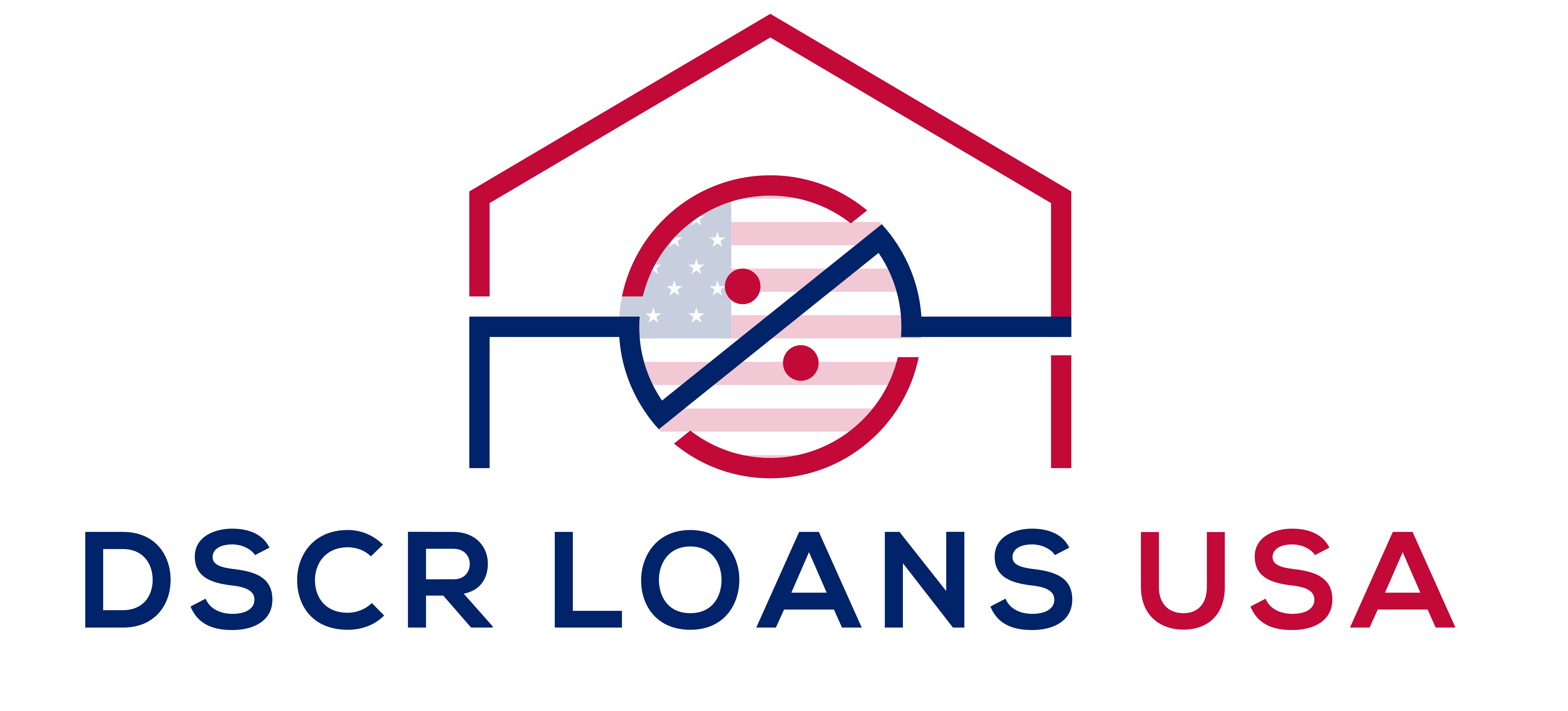DSCR Loans USA
When exploring the market for the best DSCR lenders, finding a reliable match for your investment goals is essential.
This guide cuts through the clutter to bring you a curated list of top DSCR lending options, spotlighting their loan features, application process, and how they stack up for savvy investors like you.
Key Takeaways
- DSCR loans cater to real estate investors by focusing on the property’s income potential rather than the owner’s traditional income, with a typical minimum DSCR ratio requirement ranging from 1.20 to 1.35.
- Choice of a DSCR lender should factor in interest rates, loan terms, lender reputation, and customer support, and top lenders may offer loan terms up to 40 years or down payments as low as 15%.
- The advantages of DSCR loans include a simplified application process with no traditional employment verification, potential access to larger loan amounts, and the option for properties to be financed under an LLC for better liability and tax management.
Understanding DSCR Loans: The Basics

DSCR loans are not your everyday mortgages. They’re a unique type of financing designed with real estate investors in mind. Instead of relying on the borrower’s personal income, these investment property loans focus on the income potential of the investment property. This makes them ideal for non-owner-occupied investment properties, with the lender underwriting the loan based on the property itself, not the owner’s income.
The process to secure a DSCR loan is direct and uncomplicated. As an investor, you simply need to:
- Demonstrate the rental income potential of the property.
- There’s no need for W2 forms, tax returns, or personal income verification.
- The minimum DSCR required by lenders typically ranges between 1.20 to 1.35, meaning the net operating income of the property should be 1.2 to 1.35 times higher than annual loan payments.
- The DSCR ratio is determined by dividing the property’s net operating income by its annual debt service, considering the lower of rent schedule or lease agreement relative to the PITIA payment.
Evaluating Top DSCR Lenders: What to Look For
Several key factors need consideration while selecting a DSCR lender. First up are the interest rates and loan terms. Just as with any loan, these are primary factors that will determine your monthly repayments and the overall cost of the loan. Lenders who prioritize top DSCR offer a variety of loan terms, such as:
- 30-year
- 15-year
- 20-year
- even up to 40-year options
These options, including private lenders, cater to different borrower preferences and financial situations.
But there’s more to consider than just the numbers. The features of the loan program and individual requirements are also crucial. Lastly, do your due diligence on the lender’s reputation in the real estate market. Look for reviews and testimonials from other investors. Remember, customer support is a significant aspect of a lender’s reputation.
Leading DSCR Lenders for Your Investment Portfolio

There exist several prominent lenders in the DSCR loan market, providing specialized loan products for a wide range of investment needs. We shall now examine the top-tier players in this field and analyze what they offer to investors.
Best Overall DSCR Lender
The crème de la crème of DSCR lenders is distinguishable by their competitive interest rates, fair loan terms, and excellent customer service. They understand that every investor’s needs and property types are different, and they tailor their loan terms accordingly. As one of the top dscr loan lenders, they ensure a seamless borrowing experience for their clients.
Their customer service team is responsive and helpful, guiding the loan process.
Best for Low Down Payments
For those looking for low down payment requirements, certain DSCR lenders stand out. These lenders understand that property investing is often an entry-level endeavor for many, and they offer minimal down payment requirements to make it more accessible. The lowest down payment you can find among leading DSCR lenders can be as low as 15% for qualifying investment properties.
These options often come with flexible loan terms to accommodate the varying strategies of investors.
Best for Long-Term Investment Strategies
For investors with a long-term horizon, certain DSCR lenders are more suitable. They offer 30-year loan terms, providing a long runway for investors to repay their loans and ride out market fluctuations. They have a solid reputation for stability and dependability, crucial for long-term investment plans.
Additionally, they offer favorable interest rates, impacting the total cost of borrowing over an extended period, thereby affecting the investor’s overall returns.
The Financials Behind DSCR Loans: Rates and Fees

There is a broad variation in the rates and fees of DSCR loans. Generally, mortgage rates for DSCR loans are 1% to 2% higher than those for typical investment properties, with current fixed mortgage rates ranging from 8.75% to 10.25%. However, some lenders like Kiavi offer competitive rental loan rates starting at just 7.250%.
When it comes to fees, origination fees for DSCR loans with Griffin Funding range from 1% to 3% of the loan amount. On top of this, closing costs typically range from 2% to 5% of the total loan amount. Common expenses in this category may consist of:
- Loan origination fees
- Appraisal fees
- Title search and insurance fees
- Legal fees
- Other miscellaneous costs
These expenses are typically associated with the process of obtaining a loan.
Loan Terms and Flexibility: Finding the Right Fit
In the DSCR loan industry, there isn’t a one-size-fits-all solution. DSCR lenders offer a range of loan terms and options, including:
- Short-term assistance
- Up to 40 years loan terms
- Fixed-rate 30-year loans
- Interest-only payment options
They understand that every investor has a unique strategy, and they aim to provide loan terms that align with these strategies.
For instance, Kiavi focuses on aligning with investors’ strategies, offering loan terms designed to increase DSCR, such as opting for interest-only loans or extending terms to improve cash flow. This flexibility allows investors to find the perfect fit for their investment strategy.
Application Essentials: Qualifying for a DSCR Loan
Securing eligibility for a DSCR loan is not as intimidating as it appears. The primary measure used by lenders to determine loan eligibility is the Debt Service Coverage Ratio (DSCR), which focuses on property income over personal income. Most lenders require a minimum DSCR between 1.2 and 1.25, although some lenders like Sprint Funding and Kiavi specify a standard DSCR of 1.25.
In addition to a strong DSCR, credit score requirements vary by lender, ranging from a minimum of 580 by Griffin Funding to 700 by Lima One Capital.
Eligible properties for DSCR loans often include residential properties such as single-family homes, duplexes, triplexes/quads, condos, and certain multifamily units.
Beyond Residential: DSCR Loans for Commercial Real Estate

Though commonly linked with residential properties, DSCR loans are also applicable to commercial real estate. Commercial DSCR loans can be used for a variety of income-generating properties like:
- multifamily homes
- office buildings
- retail buildings
- industrial buildings
Excluding owner-occupied properties, rental properties, and speculative investment projects.
Qualification for commercial DSCR loans primarily depends on the property’s cash flow, using the DSCR as a gauge, rather than the borrower’s personal income. Lenders usually require a minimum DSCR of 1.25 for commercial real estate loans, although some may accept lower ratios, down to 0.75, which broadens the eligibility for potential borrowers.
Navigating the DSCR Loan Process
Compared to traditional mortgage application procedures, the DSCR loan process is notably straightforward. DSCR loans offer several advantages, including:
- No traditional employment verification required
- Attractive option for real estate investors
- Strong DSCR required to qualify
- Various documents needed, such as bank statements, leases, and an appraisal
Interestingly, DSCR lenders may require fewer documents than traditional loans, often omitting tax returns in their application process. Approval times can be surprisingly quick, with lenders like Sprint Funding able to approve a DSCR loan within a week, provided you meet their credit and DSCR requirements.
Advantages of DSCR Loans Over Conventional Mortgages

DSCR loans provide a multitude of benefits over conventional loans and hard money loans. They can be easier to obtain for real estate investors who commonly deduct many expenses, thereby eliminating the need for job history or income verification during application. They also allow investors to access larger loan amounts, up to $5 million, and offer interest-only payment options for better cash flow management.
Some of the benefits of DSCR loans include:
- Easier application process for real estate investors
- No need for job history or income verification
- Access to larger loan amounts, up to $5 million
- Interest-only payment options for better cash flow management
One unique advantage is that DSCR loans can be closed in the name of an LLC, providing opportunities for improved liability and tax planning for investors. Clearly, for the savvy real estate investor, DSCR loans offer a compelling alternative to conventional mortgages.
Summary
In the dynamic world of real estate investing, DSCR loans provide a flexible, investor-centric financing solution. With loan eligibility based on the income potential of the property rather than personal income, they’re a game-changer for investors. Whether you’re a seasoned investor or just starting, remember to consider factors like interest rates, loan terms, lender’s reputation, and your investment strategy when choosing a DSCR lender. And remember, whether it’s residential or commercial real estate, DSCR loans can be a powerful tool in your investment arsenal.
Frequently Asked Questions
What is a DSCR loan?
A DSCR loan, also known as a Debt Service Coverage Ratio loan, is designed for real estate investors and emphasizes the property’s income potential over the borrower’s income. This type of loan is tailored specifically for real estate investment purposes.
How do I qualify for a DSCR loan?
To qualify for a DSCR loan, you need to demonstrate a strong DSCR, have a good credit score, and ensure that the property meets the lender’s requirements.
Can I use DSCR loans for commercial real estate?
Yes, DSCR loans can be used for various types of income-generating commercial properties.
How do DSCR loans compare to conventional mortgages?
DSCR loans offer advantages such as easier approval, larger loan amounts, interest-only payment options, and the ability to be closed in the name of an LLC, making them different from conventional mortgages.
What are the typical interest rates and fees for DSCR loans?
Typically, DSCR loan interest rates are 1% to 2% higher than those for typical investment properties, with origination fees ranging from 1% to 3% of the loan amount and closing costs typically ranging from 2% to 5% of the total loan amount.
Ready for More Great Tips and Information? Join Our Email List Today!

